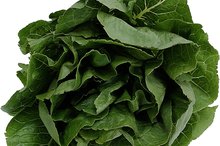Nutritional Value of Mesclun Greens vs. Romaine Lettuce
Salad greens are a low-calorie, nutrient-rich and tasty way to meet your daily vegetable needs. But you may wonder if one type of lettuce makes a better choice over another. When comparing mesclun greens, which are a mix of baby lettuces, to romaine lettuce, you will find that they both offer a number of health benefits, making either choice a healthy addition to your diet.
Calories
Mesclun greens and romaine lettuce are both foods with a low energy density, which means they have a low calorie content compared to serving size. A 1-cup serving of mesclun greens contains just 10 calories, and the same size serving of shredded romaine lettuce contains 8 calories. These low energy density greens make a good choice when trying to limit your calorie intake for weight loss.
Macronutrients
A Diet of Fruits, Vegetables & Nuts
Learn More
The macronutrients in a food item include its carbohydrate, protein and fat content. Both lettuces are fat-free and not a significant source of either carbohydrates or protein. A 1-cup serving of mesclun greens contains 2 grams of carbohydrates and 1 gram of protein, while the same size serving of shredded romaine lettuce contains 2 grams of carbohydrates, 1 gram of fiber and 0.6 grams of protein.
Vitamins
Mesclun greens and romaine lettuce can help you meet some of your daily vitamin needs. Mesclun greens are a better source of vitamin C, and romaine lettuce is a better source of vitamin A. A 1-cup serving of mesclun greens meets 5 percent of your daily value for vitamin C and 30 percent of your daily value for vitamin A, while the same size serving of shredded romaine lettuce meets 3 percent of your daily value for vitamin C and 81 percent of your daily value for vitamin A. The percent daily value is a guide developed by the Food and Drug Administration to help you find healthy foods and is based on a 2,000-calorie diet for healthy adults. As antioxidants, both vitamin A and C protect your cells from free-radical damage, lowering your risk of heart disease and certain types of cancer.
Minerals
Vitamins in Iceberg Lettuce
Learn More
Although not significantly high in minerals, both lettuce greens can help you meet your daily calcium and iron needs, with mesclun greens being a slightly better source. A 1-cup serving of mesclun greens meets 4 percent of your daily value for both calcium and iron, and romaine lettuce meets 2 percent of your daily value for calcium and 3 percent of your daily value for iron. Calcium is the most abundant mineral in your body and is necessary for bone health. Iron makes up part of the protein that transports oxygen throughout your body.
Related Articles
References
- My Fitness Pal: Calories in Shoprite Mesclun Salad Fresh Baby Lettuce & Other Greens
- Centers for Disease Control and Prevention: Low-Energy Dense Foods and Weight Management
- Office of Dietary Supplements: Vitamin A and Carotenoids
- Office of Dietary Supplements: Vitamin C
- Office of Dietary Supplements: Calcium
- Office of Dietary Supplements: Iron
Writer Bio
Jill Corleone is a registered dietitian and health coach who has been writing and lecturing on diet and health for more than 15 years. Her work has been featured on the Huffington Post, Diabetes Self-Management and in the book "Noninvasive Mechanical Ventilation," edited by John R. Bach, M.D. Corleone holds a Bachelor of Science in nutrition.









